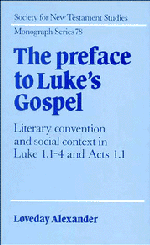Book contents
- Frontmatter
- Contents
- Acknowledgements
- Abbreviations
- 1 The Lucan preface: questions and assumptions
- 2 On the beginnings of books
- 3 Historical prefaces
- 4 Scientific prefaces: origins and development
- 5 Scientific prefaces: structure, content and style
- 6 Luke's preface
- 7 Prefaces in hellenistic Jewish literature
- 8 The social matrix of Luke's preface
- 9 The appropriate form of words for the occasion
- Appendix A Structural analysis of Luke 1.1–4 and selected scientific prefaces
- Appendix B Bibliographical notes on scientific prefaces
- Select bibliography
- Index of scientific authors
- Index of ancient authors and names
- Index of modern authors
- Index of subjects
1 - The Lucan preface: questions and assumptions
Published online by Cambridge University Press: 15 October 2009
- Frontmatter
- Contents
- Acknowledgements
- Abbreviations
- 1 The Lucan preface: questions and assumptions
- 2 On the beginnings of books
- 3 Historical prefaces
- 4 Scientific prefaces: origins and development
- 5 Scientific prefaces: structure, content and style
- 6 Luke's preface
- 7 Prefaces in hellenistic Jewish literature
- 8 The social matrix of Luke's preface
- 9 The appropriate form of words for the occasion
- Appendix A Structural analysis of Luke 1.1–4 and selected scientific prefaces
- Appendix B Bibliographical notes on scientific prefaces
- Select bibliography
- Index of scientific authors
- Index of ancient authors and names
- Index of modern authors
- Index of subjects
Summary
One of the things that make research exciting – or dispiriting, depending on mood and temperament – is the way the questions keep changing. In particular, for a researcher with any sensitivity to the ancient world, the questions we pose as twentieth-century readers often seem to be the wrong tools for understanding first-century texts. Thus research becomes, as those engaged in it know only too well, not so much a quest for answers as a constant struggle to redefine the questions.
The thesis on which this book is based (Alexander, 1978) began with what appeared to be a question about literary genre. It took its starting-point from within a debate which has been going on since the beginning of the century: in what sense (if at all) is it proper to talk of the evangelists as ‘historians’? To many New Testament critics, this is really a theological question (Haenchen, 1971, pp. 94–103); but to a student coming to the New Testament from the classical world, it seemed a question worth reframing in terms of ancient literary genre, i.e. by setting up a comparison between the Gospel writers and the historians of the Greco-Roman world. Granted that ancient expectations of history-writing may have been rather different from our own, it seemed natural to ask how the evangelists and their contemporaries would have seen their work. Did the Gospels look like histories of the same kind as those of Thucydides or Polybius, Josephus or Livy?
- Type
- Chapter
- Information
- The Preface to Luke's Gospel , pp. 1 - 10Publisher: Cambridge University PressPrint publication year: 1993

